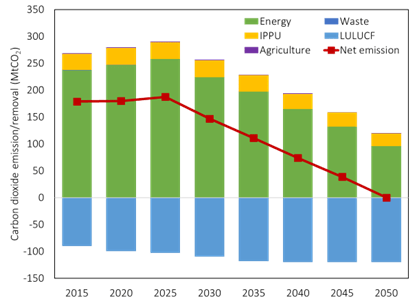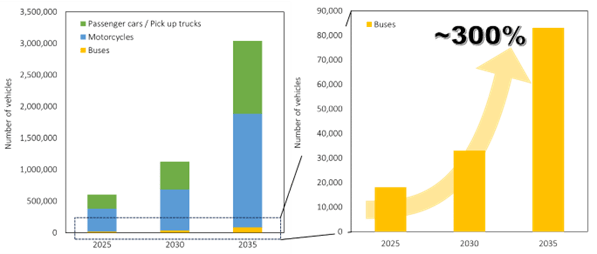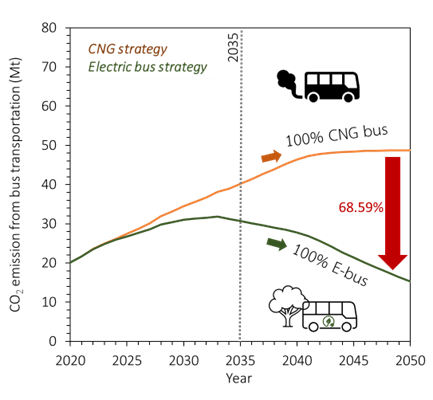21 November 2023 In Asia, Blog Post
The Green Revolution in Thailand Steering by Electric Buses
By Dr. Yossapong Laoonual and Dr. Kotchakarn Nantasaksiri, Mobility & Vehicle Technology Research Center (MOVE), King Mongkut’s University of Technology Thonburi, Thailand
At the United Nations Climate Change Conference 2021 (COP26) in Glasgow, Scotland, Thailand’s Prime Minister pledged to reduce annual greenhouse gas emissions by 40% by 2030 with the support of the international community. The ultimate goal is to achieve carbon neutrality by 2050, with a more ambitious vision of reaching net-zero greenhouse gas emissions by 2065 (Figure 1).[1]

2050 carbon neutrality target in Thailand.
The energy and transport sectors emit significant emissions and require rapid and transformative improvement. As of September 2023, Thailand is home to a total of 44 million registered vehicles, reflecting a diverse and extensive array of transport options that play a pivotal role in Thailand’s intricate transport network:[2]
- Motorcycles are taking the lead with a substantial count of 22 million registered units.
- Cars and pick-up trucks are following closely with a total of 19 million registered units.
- Trucks account for 1.2 million registered units to facilitate the massive demand for movement of goods and cargo.
- Public buses only account for 0.13 million units.
The issue of air pollution from road transport has increasingly become a social and environmental concern. Escalating threats from the high concentration of PM2.5, especially in megacities like the Bangkok Metropolitan Region, have contributed to an increasing momentum for battery electric vehicles (BEVs) adoption in Thailand.
In 2017, Thailand proactively began aligning its automotive industry with the promotion of electric vehicles (EVs) within the country. A significant milestone was reached in February 2020 when the National EV Policy Committee, led by the Deputy Prime Minister,[3] was established to position Thailand as a global hub for EV production and supply. Thailand’s “30@30” policy represents a strategic commitment to expedite the local adoption of EVs. This initiative sets a specific target that by 2030, 30% of all vehicles produced in Thailand will be electric. Aligned with the ambitious roadmap outlined by the Thai government, specific achievement targets for newly registered vehicles have been established, covering the years 2025, 2030, and 2035, as depicted in Figure 2.[4] These milestones signify critical stages in Thailand’s journey toward a greener and more sustainable transport sector. By 2025, Thailand aims to have 30% of its vehicles operating as zero-emission vehicles (ZEVs) and 50% by 2030. The ultimate aspiration is to achieve full ZEV adoption by 2035.[5]

for the years 2025, 2030, and 2035, with a focus on electric bus targets in Thailand.
Since 2020, BEVs have ignited considerable interest in the personal light vehicle segment, as evident from a surge of 400% growth in registered units from 2021 to 2022. However, the adoption of electric buses in public transport continues to lag behind, despite the government’s strong commitment to transition from conventional buses to electric alternatives. Urgent government action is imperative, particularly in light of the ambitious goal to achieve a 300% increase in electric buses by 2035 compared to 2025 (Figure 2).
Contributing to the transformation of Thailand’s public transport system, the University of King Mongkut’s Institute of Technology Ladkrabang (KMUTT) conducted a project with the United Nations Economic and Social Commission for Asia and the Pacific (UNESCAP) to study the transition to electric public buses. Notably, compressed Natural Gas (CNG) buses currently constitute a significant portion of the public bus fleet, the result of a transformative initiative undertaken by Thailand more than 20 years ago. At that time, Thailand launched an ambitious mission to address environmental issues affecting the country, primarily by promoting the adoption of CNG as an alternative to diesel fuel. This comprehensive analysis covers the period from 2020 to 2050 and envisions that, after 2035, every newly registered bus will either be powered by CNG or become fully electric, aligning with the government’s steadfast commitment to achieving 100% ZEVs by that pivotal year.

under All-New CNG and Electric Buses Strategy Post-2035 in Thailand
Figure 3 illustrates the substantial reduction in CO2 emissions resulting from Thailand’s transition to electric buses. By 2050, the data predicts a significant decrease in CO2 emissions, dropping from 48 Mt/year to a mere 15 Mt/year. Importantly, the calculation of CO2 emissions from electric buses accounts for the average emissions stemming from power generation in Thailand. This provides opportunities for further reductions by emphasising the use of renewable energy sources in power generation, which can significantly mitigate emissions when electric buses are increasingly widely adopted.
As the world continually moves towards sustainable mobility systems, it is apparent that Thailand is determined to lead the charge in the automotive industry’s eco-friendly revolution, aligning itself with global climate goals and pushing for a cleaner, greener future.
References
- UNFCCC, 2022. Thailand long-term low greenhouse gas emission development strategy. https://unfccc.int/sites/default/files/resource/thailand it-leds (revised version)_08Nov2022.pdf (Access 30 October 2023)
- Department of Land Transport, 2022. Statistics. https://web.dlt.go.th/statistics/ (accessed 21 August 2022).
- Energy Policy and Planning Office, 2021. Guidelines for promoting electric vehicles (EV) in the country according to the 30@30 policy. eppo.go.th (Access 30 October 2023) (in Thai).
- National Electric Vehicle Policy Committee, 2022. ZEV Target by Vehicle Types. https://www.boi.go.th/upload/content/1.EVAT_Business Opportunites in Thai EV Market.pdf (Access 30 October 2023).
- Ministry of Foreign Affairs, 2021. The Prime Minister participated in the World Leaders Summit during the 26th United Nations Framework Convention on Climate Change Conference of the Parties (UNFCCC COP26) in Glasgow, United Kingdom. https://www.mfa.go.th/en/content/cop26-glasgow (Access 30 October 2023).
- UN ESCAP, 2023. Study report for transitioning to electric public buses in Thailand. https://www.unescap.org/kp/2023/study-report-transitioning-electric-public-buses-thailand (accessed 21 August 2022).

Yossapong Laoonual
Dr. Yossapong is an Associate Professor in the Department of Mechanical Engineering at King Mongkut’s University of Technology Thonburi (KMUTT), Thailand. He also serves as the Head of the Mobility & Vehicle Technology Research Center at KMUTT and has recently fulfilled the role of Assistant to the President for Sustainability.
Dr. Yossapong, a key figure in the Electric Vehicle Association of Thailand (EVAT) from 2015 to 2020, served as its First President and founding member. Recognized for his significant role, he holds titles of Honorary Chairman and Advisor. He is also active in the Thailand Energy Storage Technology Association and had been on the National Electric Vehicle Policy Committee between 2020-2023.
His expertise extends to regulatory matters on air pollution control from motor vehicles, with involvement in Thailand's pollution control committee and national environment board. Furthermore, Dr. Yossapong has contributed over two decades in powertrain, alternative fuels, battery safety, and policy development for electric mobility.

Kotchakarn Nantasaksiri
Dr. Kotchakarn is a researcher working at the Mobility & Vehicle Technology Research Center (MOVE) at King Mongkut's University of Technology Thonburi (KMUTT) in Thailand. Dr. Kotchakarn, with a Ph.D. from Osaka University, focuses on interdisciplinary research for a sustainable society. Her work at Osaka University involves establishing a framework for assessing Napier grass plantations for biogas power plants, aiding regional planning. Her research covers ecology, meteorology, hydrology, global carbon cycles, biomass utilization, ecosystem modelling, and energy policy. Beyond environmental studies, she explores mobility applications, evaluating suitable locations for electric vehicle charging infrastructures to promote adoption and improve Thailand's transportation sector sustainability. Dr. Kotchakarn actively contributes to shaping a more sustainable and ecologically responsible future.